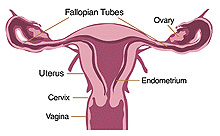Cell Biology & Histology A560
|
Female Reproductive System |
|
|
 Structures
in the female reproductive system are specialized for the
production, movement, fertilization and maintenance of the female
gamete and for the reception of sperm. In studying the system, one
must keep in mind the major cyclical influence of hormones on
various parts of the female reproductive system, which results in a
dynamic and constantly changing morphology. Structures
in the female reproductive system are specialized for the
production, movement, fertilization and maintenance of the female
gamete and for the reception of sperm. In studying the system, one
must keep in mind the major cyclical influence of hormones on
various parts of the female reproductive system, which results in a
dynamic and constantly changing morphology.
Learning Objectives:
- Understand the overall
organization of the ovary.
- Identify follicles at all stages
of development from primordial to Graafian and understand their
physiological significance.
- Describe the process of corpus
luteum formation.
- Distinguish corpus luteum, from
corpus albicans and from atretic follicles, with respect to
structure and function.
- Identify the layers in the wall of
the uterine tube, know the functions of the component cells, and
recognize the different tubal regions.
- Recognize the layers of the
uterine wall, the functional significance of their components and
their changes during the menstrual cycle.
- Recognize histological features of
the cervix, ectocervix, and vagina.
- Understand the structure of the
mammary gland and how it changes during puberty, pregnancy, and
lactation.
We start with
the ovary. |
|